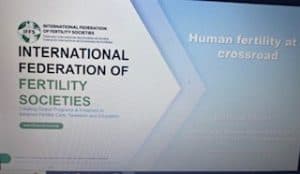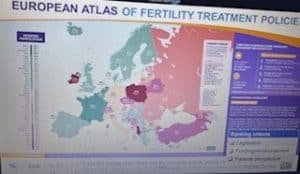2 April 2025
Louisa Ghevaert was pleased to attend Progress Educational Trust’s event “Is Fertility Treatment A Solution To Population Decline?” on 26 March 2025. Fertility is continuing to decline across the globe and birth rates are steadily falling. Fertility rates are now at the lowest in the UK since World War II. As such, this event looked at a range of factors influencing declining global fertility and birth rates and debated whether fertility treatment can bridge the gap and solve population decline. It also shone a light on the need for the UK to have better policies from a fertility perspective with more impact as a number of issues are not addressed in the workplace and this is affecting women’s decisions to have children.
Professor Nargund delivered the first expert session. She set the scene explaining that declining populations and fertility rates are due to demographic and economic shifts, resulting in aging populations, pressure on public services and pensions. She explained that the fertility rate required to replace and sustain population levels is 2.1 children per woman. However, the fertility rate in the UK is currently 1.44 children per woman, with 590,000 babies born in England and Wales in 2023 being fewer than any year since 1977. Furthermore, deaths outweighed births in the UK for the first time in 50 years.
Professor Nargund explained that this is very worrying picture and the UK needs better policies from a fertility perspective with more impact. She explained that a number of issues are not addressed in the workplace and this is affecting women’s decisions to have children. As such we need to do more in the UK to provide public funding for assisted reproductive technologies, provide more inclusive policies for same-sex single and single women and make IVF more affordable.
Interestingly, Professor Nargund went on to explain that a research paper in 2015 showed that the lifetime economic value of an infant born in the UK is about 800,000.00 euros, which is a huge return on investment if we spent £20,000 on three cycles of fertility treatment. As such, she explained that we need to prioritise long-term thinking and invest in comprehensive, complementary and sustainable family support services. Additionally, we need to encourage research and collaboration and promote and prioritise gender equality.
Image: Professor Geeta Nargund, Lead Consultant for Reproductive Medicine at St George’s University Hospitals, and Medical Director of CREATE Fertility and ABC IVF, Co-Founder and Medical Adviser at Ginsburg Women’s Health Board, and contributor to the recent Economist Impact report Fertility Policy and Practice: A Toolkit for Europe
Professor Bart Fauser, Scientific Director of the International Federation of Fertility Societies (IFFS), and Emeritus Professor of Reproductive Medicine at Utrecht University, presented the next expert session. He explained that more women are having less children at a later age and more women are remaining childless. He went on to say that there are many factors affecting fertility choices, including the fact that many young people are not financially independent.
Professor Fauser explained that having a family is a human right. Countries need to adopt family friendly policies and make fertility care more accessible. He went on to ask why there is resistance to this? He explained that previously, there was a concerted focus on decreasing fertility rates and childbirth. He went on to say that demographic change has a profound impact on Europe’s ability to compete globally and that Europe is an aging continent.
Professor Fauser asked what assisted reproductive technologies can do for declining population and fertility rates? He explained that 20 million children have now been born around the world through assisted reproductive technologies. However, he explained that there has only been one study 20 years ago on whether assisted reproductive technologies can make up for fertility decline and this concluded that it could not make up for the decrease in national fertility levels.
Professor Fauser concluded his session by looking at possible steps to address declining population and fertility rates. He explained that we need to make society aware of the implications of underpopulation. We should make fertility care part of family building strategies. We also need to take infertility more seriously and there should be public funding for fertility care.
Dr Chris Skedgel described in his expert session how the world is experiencing a “demographic contraction”. He explained that this raises serious questions from a generational transfer perspective. Workers today fund retired people and population decline raises issues about how we will fund healthcare and pensions in the future. He went on to explain that there is a pattern of people having fewer children later in life. There is an association between women’s educational attainment and fewer children. Is this because women are achieving more freedom? Does education open up more opportunities for women and provide a better quality of life? Is this resulting in higher standards of happiness for women? He added that patterns of human development are changing as well. There is an increase in intended childlessness which leads to no children at all.
Dr Chris Skedgel went on to explain that reduced child mortality and child labour and changing expectations for parenting have shifted parenthood goals from “quantity” to “quality”. Better contraception is also resulting in a reduction in unintended pregnancies. Added to this, the increasing cost of living is a disincentive for having children, along with increasing societal acceptance of not having children. He added that another contributing factor is changing gender roles, with increased female participation in the workplace.
Dr Chris Skedgel explained that one option to seek to address declining population and fertility is to place more focus on the 1 in 6 prospective parents who have experienced infertility. However, he explained that this is only likely to fill ten percent of the current fertility gap and this leaves ninety percent that needs to be addressed more widely. He explained that fertility treatment in itself is unlikely to compensate for a trend towards smaller family sizes or overcome broader economic challenges that may undermine fertility rates. He concluded his session asking whether we therefore need to change our institutions instead?
Image: Dr Chris Skedgel, Director of the Office of Health Economics, Honorary Research Fellow at the University of East Anglia’s Health Economics Group, Lead author of research and commentary – in BMJ Open, The Patient and PharmacoEconomics Open – on how the public values fertility treatment
Dr Paul Morland gave the final expert session of the event and he explained that declining population and fertility rates is a very serious problem if we do not address it. He explained that there are different causes for falling fertility rates around the world. There is also a distinction to be made between biological fertility and the demographic tendency to have children (which is culturally and economically driven).
Do Morland explained that people having children later in life have more biological fertility issues, although the numbers are relatively modest. As such, fixing this issue is only a small part of the picture. He added that there is a whole range of issues which are causing fertility declines. There is an increasing dissociation of men and women building relationships. Cities and housing are also being built in an unfriendly way. There is also an issue with children being taught how not to get pregnant whilst little is explained to them about how fertility declines if you wait too long to conceive a child. As such, there are complex social and economic issues at play and we do not have a complete handle on these.
Dr Morland went on to say that we need to build towards a pro-natal culture so that government can push on a more open door and not a closed ante-natal door. He explained that government signalling is a very important part of the picture too. He explained that if we put off having children, we are more likely to need fertility treatment. As such it is important for government to signal that supporting fertility support is not just a welfare state issue but will also help ensure future generations will be there to enable society to flourish. He concluded his session saying there is a responsibility to pass this on to future generations and that the immigration rate is not going to help over time as they integrate into society and see declining fertility rates as well.
Image: Dr Paul Morland, demographer, author and broadcaster, author of books including No One Left: Why the World Needs More Children, Tomorrow’s People: The Future of Humanity in 10 Numbers and The Human Tide: How Population Shaped the Modern World, previously an Associate Research Fellow at Birkbeck University of London and a Senior Member at St Antony’s College
The Value of Fertility & Family Law Expertise, Advisory & Consultancy
Given declining global fertility rates, delayed family building and later-life parenthood, it is more important than ever to maximise and protect individual fertility and pathways to parenthood. Specialist fertility and family law strategies, advisory and consultancy helps inform effective approaches to (in)fertility and maximise reproductive health outcomes, as well as proactively manage family building arrangements. They identify and address a range of legal and practical issues across the family building and reproductive life cycle from pre-conception, through pregnancy, birth, family life and end-of-life, including:
- Family building options and associated legal issues due to impaired fertility including cancer diagnosis, unsuccessful conception, miscarriage, age-related fertility decline, genetic disorders, change in gender, delayed parenthood.
- Complex personal and family situations.
- Legal and practical aspects of fertility preservation.
- Navigating fertility treatment law in the UK.
- DNA and genetic testing and the law.
- Legal and practical aspects of assisted conception with an intra-family donor, known donor, anonymous/identity-release donor, co-parent or ex-partner (e.g. legal parentage, parental rights, financial responsibility and dispute mitigation).
- 3-person IVF and the law.
- Legal and wider aspects of international surrogacy or a UK surrogacy arrangement.
- Import or export of genetically matched gametes and embryos.
- Posthumous conception law and genetic legacy.
- Expert witness fertility, donor conception and surrogacy law services.
- Care and upbringing of children and complex family law issues and disputes.
Images: Louisa Ghevaert, CEO & Founder Louisa Ghevaert Associates
To find out more about Louisa Ghevaert click here.















